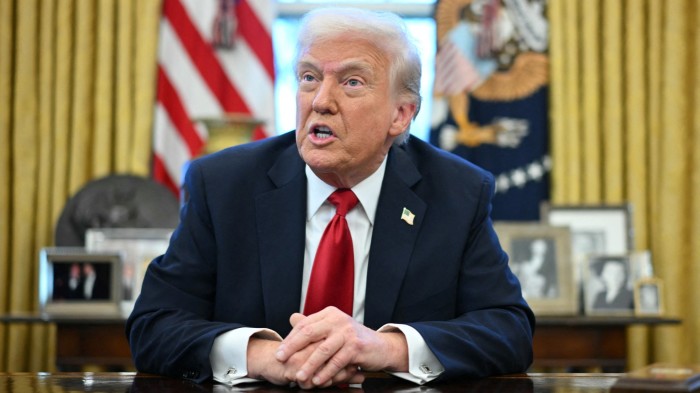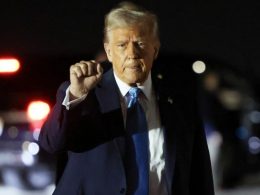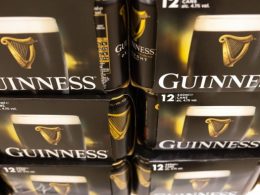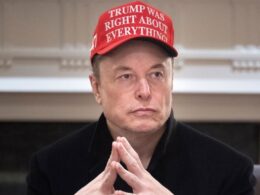This article is an on-site version of our FirstFT newsletter. Subscribers can sign up to our Asia, Europe/Africa or Americas edition to get the newsletter delivered every weekday morning. Explore all of our newsletters here
Today’s agenda: HSBC’s ruthless cost-cutting; China seeks IPO revival; Reeves’ repair job; FT film on governments’ debt “addiction”; and Trump battle boosts world leaders’ ratings
Good morning. We start the day with the latest escalation in Donald Trump’s trade war: a 25 per cent tariff on all foreign-made cars.
What to expect: The new tariff will go into effect on April 2, the US president’s self-imposed deadline for unveiling numerous reciprocal duties against US trade partners. They will apply to completed vehicles and foreign car parts, including engines, transmissions, power-train parts and electrical components. Asked if there was anything carmakers could do to have the tariffs removed, Trump replied: “This is permanent, 100 per cent.”
Who will be affected? Almost half of vehicles sold in the US are imported and cars assembled in the US contain nearly 60 per cent foreign-sourced parts, according to an analyst. A 25 per cent tariff lasting beyond four to six weeks is likely to have “a chilling effect” on the sector, he added. Shares in Ford, General Motors and Chrysler parent Stellantis fell in after-hours trading yesterday. Another expert said vehicle prices were likely to rise as carmakers pass their increased costs on to consumers. The tariffs will also hit key trading partners including Mexico, Canada and the EU. Here’s how they have responded.
And here’s more on other US tariffs, including the fallout at home and abroad:
-
China: Trump’s levies on the country are forcing US companies to negotiate price cuts from Chinese suppliers, shift production and increase prices for consumers.
-
EU: The bloc’s top trade negotiator expects Trump to hit it with tariffs of about 20 per cent next week.
-
US oil: Shale executives warn that the “chaos” from the president’s tariffs and his quest to drive down energy prices undermine his “drill, baby drill” agenda.
For more on the impact of Trump’s trade policies, sign up for our Trade Secrets newsletter if you’re a premium subscriber, or upgrade your subscription. And here’s what else we’re keeping tabs on today:
-
Economic data: The US reports its revised fourth-quarter GDP estimate.
-
Europe: European leaders gather in Paris to discuss the deployment of a joint “reassurance force” to enforce any ceasefire deal in Ukraine, while the European Central Bank’s general council meets.
-
Results: M&C Saatchi, Next, H&M and Lululemon report.
Join Financial Times experts at 1pm GMT today for a subscriber-only webinar, as they discuss Ukraine’s future with Russia’s full-scale invasion entering its fourth year. Register for free.
Five more top stories
1. Exclusive: HSBC fired bankers on the day they were due to learn their bonus figures and gave no bonuses to many it let go. The move, which affected some staff at vice-president level and above in its UK investment banking unit, is a sign of how the lender is taking a more ruthless approach to costs under new chief Georges Elhedery.
2. Chinese regulators have told some companies that they can begin the process of launching mainland initial public offerings once more. The government had earlier been concerned that IPOs could further weigh on a stock market that, until autumn last year, had been falling for years. The move appears to mark a shift in approach.
3. TSMC’s pledge to spend $100bn will do little to help the US restore its global lead in chipmaking, said former Intel chief Pat Gelsinger. While Taiwan Semiconductor Manufacturing Company announced plants in the US recently, its research and development is still in Taiwan, he said. “If you don’t have R&D in the US, you will not have semiconductor leadership in the US.”
4. Fox News has attracted 125 new blue-chip advertisers since the US election, including Amazon, GE Vernova, JPMorgan Chase, Netflix and UBS. These companies have recently aired advertisements on Fox News for the first time in at least two years, as Rupert Murdoch’s cable television channel sees soaring viewership in Trump’s second presidency.
5. The Trump administration’s cuts to the federal workforce are raising worries over the quality of US economic data. Economists are concerned that Elon Musk’s cost-cutting drive will undermine officials’ ability to collect, analyse and research statistics on the world’s biggest economy, dealing “a death blow to already very stretched survey operations”.
-
Maga’s spending conundrum: In many places where Trump is hugely popular, residents are increasingly reliant on state income transfers. The issue could fracture the Republican party.
News in-depth

Rachel Reeves insists she has put the UK public finances on a stable footing, but the government’s fiscal watchdog made clear how easily she could get knocked off balance. The £14bn fiscal repair job the chancellor undertook yesterday was never meant to happen in the first place, and forecasts from the Office for Budget Responsibility show Reeves remains in perilous fiscal waters.
If you missed yesterday’s Spring Statement, here’s a quick summary of what you need to know, and more analysis.
We’re also reading and watching . . .
-
🎬 ‘Addicted’ to debt: With developed economies around the world saddled with debt, the FT’s latest film explores whether government borrowing could spiral out of control.
-
Trump and the F-35: As its commitment to Nato wavers, some of America’s allies are rethinking their interest in buying Lockheed’s stealth fighter jet.
-
Arctic frontier: The region’s increased accessibility due to climate change and Trump’s rhetoric are putting it higher on Canada’s military agenda.
-
Ben & Jerry’s: The ice-cream maker’s strange legal agreement with Unilever 25 years ago was bound to cause trouble, writes John Gapper.
Chart of the day
Leaders across the world from France to Mexico are enjoying a ratings bump after going head to head with Trump.
Take a break from the news . . .
For more than 50 years, a mysterious trove of rare coins remained buried in the garden of an obsessive connoisseur dubbed “The Traveller”, who wanted to keep them hidden from the Nazis. Now the gold and silver coins, spanning ancient Greece to 20th-century Britain, will be sold in auctions starting in May.

Source link










